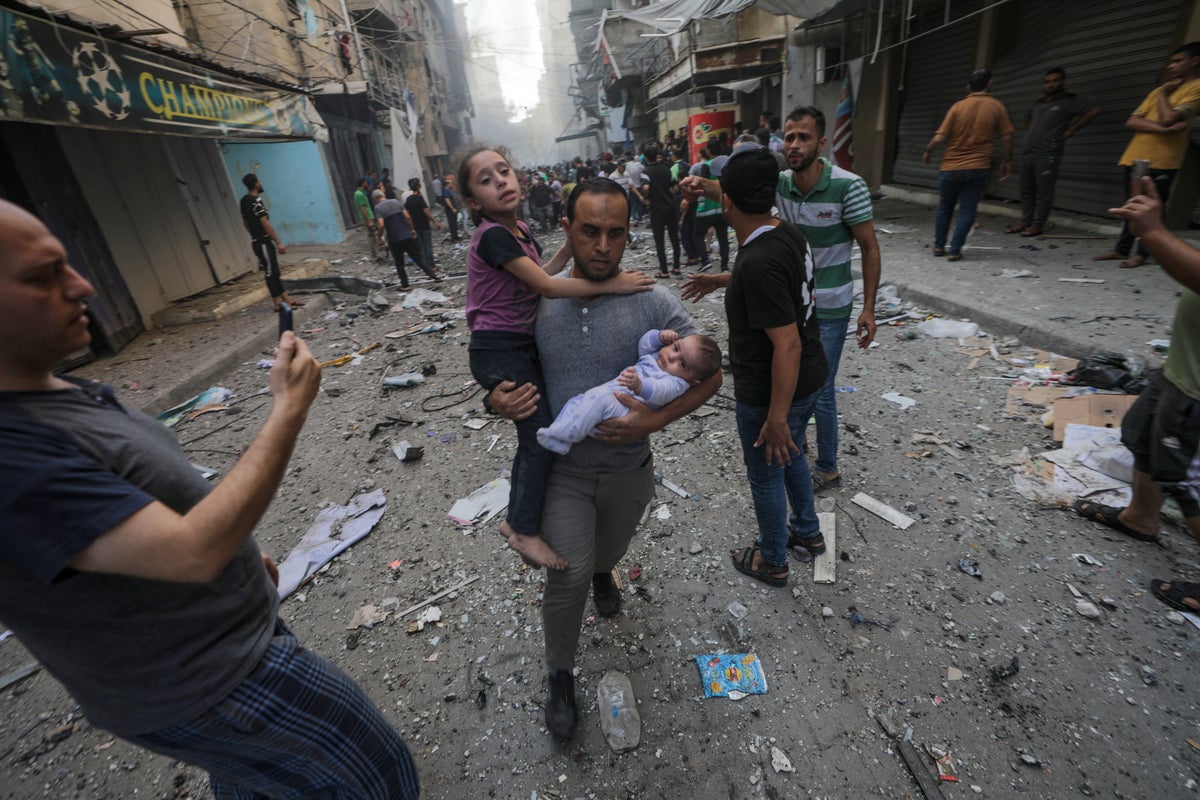
Israel has warned that a “comprehensive” attack on Gaza will soon be conducted by “land, air and sea”, as thousands of pro-Palestinian protesters took to the streets across the UK calling for peace.
Benjamin Netanyahu, the prime minister of Israel, told soldiers gathered at Gaza’s borders on Saturday that “the next stage is coming”, as his armed forced prepared for a bloody offensive that many fear could result in the death of hundreds of civilians.
He spoke to troops in Be’eri and Kfar Aza, a kibbutz where he has claimed Hamas militants slaughtered babies in the first hours of their unprecedented terror attack on southern Israel last Saturday.
Mr Netanyahu’s remarks came as women and children were confirmed among 70 Palestinians killed, reportedly during an Israeli airstrike on the “safe route” through the Gaza Strip on Friday.
Since the Hamas attack last Saturday:
- More than 2,200 have been killed in Gaza, including 724 children and 458 women, according to the Palestinian health ministry
- Thousands of Palestinians fled from the north of the besieged Gaza Strip to the south after an Israeli evacuation order
- A top Hamas commander was killed in rolling airstrikes conducted by the Israeli army
- The UN warned food and fresh water was rapidly running out, risking the lives of millions
- Prime minister Rishi Sunak was warned by a senior Tory MP that the UK could be legally complicit in Gaza war crimes
Footage of at least a dozen bodies, some of whom lay on the street while others were in damaged vehicles, was verified on Saturday. The Palestinian civilians were fleeing southward following an order from the Israeli army to evacuate the northern regions of Gaza ahead of the expected ground offensive.
The Israeli Defence Forces (IDF) had repeatedly said they would not target civilians, though reports from the local emergency organisations suggested multiple aid workers travelling in ambulances had already been killed.
Meanwhile, more than a million Gazans were in a race against time to evacuate northern areas of the enclave, a move that the United Nations said at the time was “impossible” and would have “devastating humanitarian consequences”.
Gazans flee southwards after orders to evacuate from the Israeli army— (AP)
The Israeli military prepares for the ground attack at Bar’am kibbutz on Saturday— (Anadolu via Getty Images)
The enclave, about 42km (26 miles) long and only 12km (7.5 miles) wide, has been continually bombarded with retaliatory airstrikes since the attack last week. Navigating through the streets, blocked by the rubble of destroyed apartment buildings, has proven increasingly difficult for besieged Gazans.
The latest death toll figures from the local health ministry, controlled by Hamas, report that more than 2,200 Palestinians have been killed and roughly 8,800 wounded.
An evacuation southward through the enclave is perilous and the World Health Organisation said it was a “death sentence” for those already injured.
The UN also said that more than 2 million people are at risk of dying of thirst after clean water started to run out in Gaza when the water plant stopped working.
In the UK, Crispin Blunt, a former chair of parliament’s foreign affairs committee, has written to Rishi Sunak warning the UK is in “legal peril” on account of his “apparent unqualified support to the policy of the government of Israel”.
The International Centre of Justice for Palestinians, which Mr Blunt co-chairs, has issued a notice of intention to prosecute UK officials and says there is “clear evidence that Israel has committed war crimes”.
Meanwhile, thousands of protesters marched through London and elsewhere including Manchester, Newcastle, Bristol and Glasgow.
Among those demonstrating were countless Palestinians with friends and family trapped in the enclave. Many had lost contact following the announcement of the ground offensive as services into the region were cut off to prepare for the arrival of the Israeli troops.
Ismail Patel, chair of the Friends of Al-Aqsa organisation, one of the main groups behind the march in London, told The Independent that it was “becoming more and more difficult to be in touch with people in Gaza”.
“While I was having one conversation with one friend in Gaza, their phone cut out,” he said. “I don’t know what’s happened to them anymore.”
Elsewhere, Israel’s military said on Saturday it had killed two Hamas commanders who were behind the cross-border deadly rampage last week. The military said it killed Murad Abu Murad, who was the head of the Hamas aerial system, and Ali Qadi, a top commander of a commando force.
An Israeli airstrike in the Gaza Strip on Saturday— (AP)
Israeli officials, including Mr Netanyahu, have routinely compared Hamas to Isis while accusing the group of using Palestinian civilians as “human shields”, which is a war crime.
Around 360,000 reservists have been called up by the IDF to launch the imminent offensive into Gaza
A statement from the army said “essential combat equipment had already been dispatched” to positions near the enclave and that “battalions and soldiers are strategically deployed across the country”.
In a televised speech on Saturday, Ismail Haniyeh, a top Hamas official, remained defiant. He said that “all the massacres” will not break the Palestinian people, urging Gazans again to remain in their homes.







